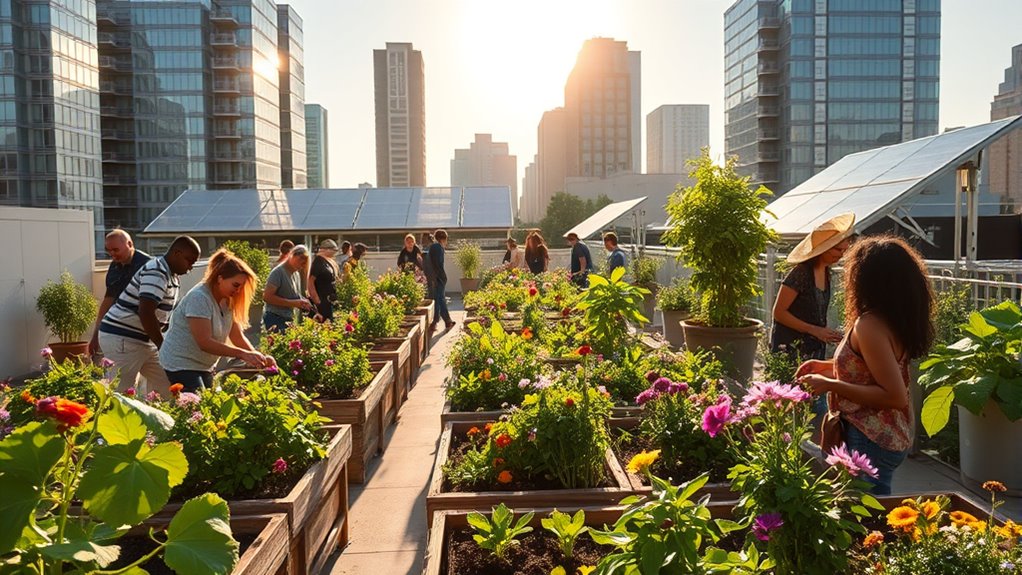To adopt sustainable living with eco-friendly trends, start by thinking twice before shopping and choosing secondhand items. Ditch single-use plastics and opt for reusable bags. Embrace a plant-based diet to cut greenhouse gas emissions. Be mindful of water usage by fixing leaks and considering xeriscaping. Drive less by choosing greener transportation options. Finally, make energy-efficient upgrades at home. There are plenty of additional steps you can take to enhance your eco-friendly lifestyle.
Key Takeaways
- Choose sustainable materials and products to minimize your carbon footprint and promote environmental conservation.
- Incorporate a plant-based diet to significantly lower greenhouse gas emissions from food production.
- Reduce single-use plastics by opting for reusable bags and unwrapped produce to decrease waste.
- Implement energy-efficient technologies, like smart thermostats, to optimize energy usage and reduce costs.
- Engage in community initiatives and advocacy to foster collective responsibility for sustainability and environmental protection.
Understanding Eco-Friendliness

Understanding eco-friendliness is essential if you want to make a positive impact on the environment. By adopting eco-friendly practices, you can greatly reduce your carbon footprint and promote sustainability.
Choosing sustainable materials in your daily life helps conserve natural resources and lowers greenhouse gas emissions. For instance, opting for plant-based diets can lower the greenhouse gas emissions associated with food production, which is a major contributor to global emissions.
Embracing sustainable materials and plant-based diets significantly reduces greenhouse gas emissions and conserves our precious natural resources.
You should also consider renewable energy sources, like solar or wind, to power your home. Solar energy provides economic benefits through job creation in manufacturing, installation, and maintenance sectors, as well as reductions in energy costs for consumers. Engaging in community initiatives and advocating for eco-friendly policies further strengthens collective efforts toward a healthier planet.
Every small action counts, and together, you can help reduce carbon emissions and create a more sustainable future.
Think Twice Before Shopping

Before you make that next purchase, consider the environmental impact of your choices. Every product has a footprint, so think about whether you really need it.
Opt for secondhand items to reduce your carbon emissions and lessen the demand for new resources. When buying new, look for products with minimal packaging and made from lower-impact materials to decrease pollution and resource consumption.
Remember, recycling doesn’t erase the damage done during production and distribution, making mindful purchasing essential.
Finally, be aware that nearly 40% of edible food in the U.S. goes to waste. By practicing conscious consumption, you can greatly cut down on food waste and contribute to a healthier planet. Additionally, adopting a budget plan can help prioritize sustainable purchases and limit unnecessary spending.
Ditch Plastic and Switch to Reuse

Mindful shopping leads naturally to another important step in sustainable living: reducing plastic usage.
You can greatly reduce waste by ditching single-use plastics like water bottles and straws. Instead, switch to reusable alternatives that not only help the environment but also save you money in the long run.
Choose unwrapped produce and bring your own reusable bags when shopping to cut down on plastic waste. Every piece of plastic you avoid contributes positively to our planet, as a staggering 80% of marine debris is plastic, harming wildlife and ecosystems.
Opt for unwrapped produce and bring reusable bags to minimize plastic waste and protect our planet’s ecosystems.
By implementing these eco-friendly practices, you foster a culture of sustainability and environmental awareness that benefits everyone.
Let’s make conscious choices for a cleaner, greener future!
Take Extinction Off Your Plate

As you consider your food choices, remember that what you put on your plate can directly impact the planet and its wildlife.
Adopting a plant-based diet is one of the most effective ways to reduce greenhouse gas emissions and combat deforestation. By choosing to reduce meat consumption, you also support sustainable agriculture practices that promote biodiversity and protect ecosystems.
Shopping smartly and planning your meals can help minimize food waste, as nearly 40% of edible food in the U.S. goes to waste. Additionally, opting for locally sourced and seasonal foods reduces transportation emissions and fosters a healthier planet. Incorporating chia seeds for weight loss into your diet can also provide essential nutrients while supporting sustainable eating habits.
Your mindful eating choices not only benefit your health but also contribute to the preservation of endangered species and the environment.
Be Water Wise

While it’s easy to overlook water use in our daily lives, being water wise is essential for both the planet and our communities. You can start by embracing water conservation in simple ways, like fixing leaks and shortening showers.
Did you know that approximately 2.1 billion people lack access to safe drinking water? By shifting towards a plant-based diet, you can greatly conserve water typically consumed by animal agriculture.
Approximately 2.1 billion people lack safe drinking water; choosing a plant-based diet can significantly reduce water usage.
Additionally, consider implementing sustainable landscaping practices like xeriscaping, which uses native plants to reduce outdoor water consumption. Don’t forget about rainwater collection; it’s a great way to irrigate your garden while easing the strain on municipal water supplies.
Every drop counts, so let’s make a conscious effort to conserve water! Moreover, adopting energy-efficient systems like heat pumps can help further reduce overall energy demand while promoting sustainable living.
Drive Less, Drive Green

Water conservation is just one part of living sustainably; another important aspect is reducing your reliance on fossil fuels.
You can drive less by opting for public transport, biking, or walking whenever possible. These eco-friendly choices can considerably lower your carbon footprint—by up to 45%!
Combine errands into fewer trips to cut down on emissions and boost fuel efficiency. If you do need to drive, consider maintaining your vehicle regularly; simple actions like oil changes and proper tire inflation can enhance fuel efficiency by up to 10%.
Finally, advocate for electric vehicle infrastructure in your community to create cleaner transportation options and further reduce fossil fuel dependence. Additionally, consider conducting energy audits to identify further ways to enhance your home’s efficiency and reduce overall energy consumption.
Every small effort contributes to a healthier planet.
Green Your Home

You can make a big impact on your energy bills by upgrading to energy-efficient appliances and installing smart thermostats. These upgrades not only help you save money but also reduce your carbon footprint. Additionally, adopting preventive maintenance plans for your appliances can further enhance their efficiency and lifespan, contributing to a more sustainable home.
Energy Efficient Appliances
Upgrading to energy-efficient appliances not only lowers your energy consumption but also contributes to a healthier planet. By choosing eco-friendly, energy-saving appliances, you can reduce your carbon footprint considerably—newer models use 10-50% less energy compared to older ones.
Look for appliances with high energy ratings, like an “A,” to make informed decisions that benefit both your wallet and the environment. Additionally, investing in durable and repairable appliances helps minimize waste, as the UK produces around 1.5 million tonnes of electrical waste annually.
New regulations guarantee manufacturers provide spare parts, making repairs easier and extending the life of your energy-efficient products. This way, you’ll enjoy long-term savings on utility bills while promoting sustainable living. Furthermore, incorporating heat pumps’ energy efficiency into your home can lead to even greater reductions in your overall energy consumption.
Smart Thermostats Benefits
While many homeowners seek ways to enhance energy efficiency, smart thermostats offer a convenient solution that can markedly reduce energy costs. By optimizing heating schedules based on usage patterns, these devices can lead to energy savings of up to 16.5%.
Here are some key benefits:
- Remote control via smart devices for convenient adjustments
- Presence-sensing technology automatically manages heating and cooling
- Easy monitoring of energy usage to identify improvement areas
- Compatibility with renewable energy sources like solar and wind
- Encouragement of sustainable practices in your home
Additionally, the integration of renewable energy technologies is expected to increase efficiency by over 40%, further supporting the effectiveness of smart thermostats.
Switching to smart thermostats not only boosts your energy savings but also supports eco-friendly living, making your home more efficient and environmentally conscious.
Educate and Advocate for Sustainability

As awareness of climate change grows, educating yourself and others about sustainability becomes essential. You can make a difference by engaging in community initiatives like clean-ups, fostering a sense of responsibility. Advocate for policy changes by supporting candidates who prioritize environmental protection. This can lead to impactful legislation against climate change.
Participating in local discussions empowers you to share knowledge and promote eco-friendly practices. Here’s a quick look at actions you can take:
| Actions | Benefits |
|---|---|
| Educate Yourself | Knowledge leads to action |
| Join Community Initiatives | Strengthens local environments |
| Advocate for Policies | Influences larger change |
Additionally, understanding the impact of green technologies can enhance your advocacy efforts and demonstrate the importance of innovation in achieving sustainability.
Frequently Asked Questions
What Should We Do to Adopt an Eco-Friendly Lifestyle?
To adopt an eco-friendly lifestyle, start by evaluating your consumption habits. Ask yourself if you really need an item before buying it.
Ditch single-use plastics—use reusable bags and containers instead.
Consider shifting to a plant-based diet to lower your carbon footprint. Support local and seasonal foods to minimize transportation emissions.
Finally, get involved in community initiatives that advocate for sustainability. Every small change you make contributes to a healthier planet.
How Do You Adopt Sustainable Living?
Adopting sustainable living is like planting a garden; it takes care and commitment to grow.
Start by reducing waste—embrace “Reduce, Reuse, Recycle.” Shift to a plant-based diet; even small changes matter. Choose energy-efficient appliances to cut down on electricity use.
Fix leaks and install low-flow fixtures to save water. Finally, support local businesses by buying seasonal products.
Each step you take nurtures a healthier planet for everyone.
How Can You Adapt a More Sustainable Lifestyle?
To adapt a more sustainable lifestyle, start by reducing single-use plastics; switch to reusable bags and bottles.
Embrace a plant-based diet, focusing on reducing food waste through smart shopping and meal planning.
Support local businesses and engage with community-supported agriculture programs.
Implement energy-saving measures at home, like using LED lights.
Finally, educate yourself and others about environmental issues, participating in local initiatives to promote sustainability and collective action.
How Can We Live in a More Environmentally Friendly Way?
So, you wanna save the planet while sipping your artisanal avocado latte? Great! Start by ditching that steak for some greens; cows aren’t exactly eco-friendly roommates.
Install solar panels—your roof deserves a spa day, too. Conserve water like you’re in a drought-themed reality show. Support local businesses; they’re the cool kids on the block.
And for goodness’ sake, stop tossing food! Compost it instead—your garden will thank you, and so will Mother Earth!
Conclusion
Embracing sustainable living isn’t just a trend; it’s a necessity for our planet’s future. By adopting eco-friendly practices, you’re not only reducing your carbon footprint but also inspiring those around you to do the same. Remember, every small change counts—like a pebble creating ripples in a pond. So, whether you’re ditching plastic or driving less, your actions matter. Together, let’s cultivate a healthier world for generations to come and make sustainability a way of life.









